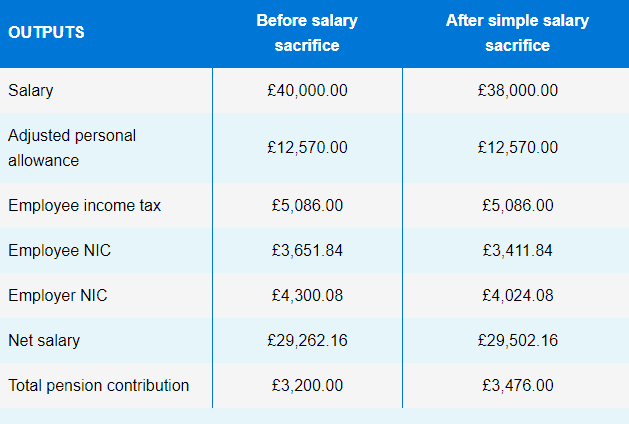As a business owner, you know that remunerating your employees fairly can help to increase employee motivation, attract talent and retain high quality people. Well, one way to put more money in to your employees back pocket without costing you a penny is pensions salary sacrifice. It sounds a bit counterintuitive, employees sacrifice some of their earnings which reduces their gross pay, whilst ultimately taking home more each month, so let’s take a look.
What is pensions salary sacrifice?
Salary sacrifice is an arrangement where an employee ‘sacrifices’ some of their salary in exchange for a non-cash benefit. In the case of pensions, the non-cash benefit is additional pension contributions by the employer.
Currently, under auto-enrolment employees contribute 5% of their salary to their pension and the employer contributes 3%. This gives the employee a total pension contribution of 8%. Salary sacrifice works by the employee giving up a proportion of their salary, in exchange for greater employer pension contributions.
So, an employee may give up 5% of their salary, in exchange for an increase in the employer pension contributions equal to the amount given up.
This means that the employee earns a lower salary and the employer is responsible for all the pension contributions. This has a number of advantages as it:
- Reduces the employee income tax and national insurance contributions (NIC), delivering an overall tax saving.
- Reduces the employer NIC.
Done correctly, this can generate an overall tax saving which means employee ends up taking home more than they used to.
Pension salary sacrifice: An example
An employee who previously had a gross salary of £40,000 currently pays 5% under auto enrolment. The employee will sacrifice 5% of their salary in exchange for employer pension contributions. The employee gross salary is now £38,000. This saves the employee £240 in employee NIC.
In addition, the employer was previously contributing 3% under auto enrolment. Due to salary sacrifice, the employer now pays both the employee and employer pension contribution of 8%. As the employee gross salary is now £2,000 lower this generates a saving of £276 of NIC for the employer. The employer has a choice as to how to share this benefit with the employee. They can pass a proportion of the employer NIC saving on to the employee, they can retain this or they can give all of the of the saving to the employee, improving their overall pay packet and helping to attract and retain staff.
The net impact is:
- The employee has saved £240, increasing their take home pay
- The employer has saved £276
For businesses with a high number of employees or with a high average employee salary the tax savings can be significant and put more cash in the hands of BOTH the employees and the business owners.
It’s worth noting that greater savings can be generated using smart salary sacrifice. This is where the employees take home pay is kept the same as before, with the saving put in to their pension pot. If you’re interested in these additional savings then get in touch with us.
Salary sacrifice pension: A run down of the advantages and disadvantages
We’ve already seen that salary sacrifice pensions can reduce the amount of tax the employee and employer pays, but what are the other advantages:
- Puts more money in to your pension: rather than increase take home pay, the employee can elect to put the tax saving in to their pension, increasing their pension contributions.
- Helps businesses to increase take home pay at no cost – particularly useful in challenging times where the business cannot afford pay rises.
- Can help businesses to attract and retain top talent with generous pension contributions – particularly if the company contributes the employer NI tax saving to the individuals pension.
Despite the advantages, there are also some pitfalls and things to watch out for:
- The employee is reducing their salary, which can have an impact on mortgages, loans and other borrowings.
- The reduction in employee salary can also impact things such as tax credits, life cover, maternity pay and so these are all considerations to be mindful of.
Salary sacrifice pension: wrapping up
We hope you found this useful. If you’re interested in salary sacrifice pension’s and want to understand what the total tax savings could be for your business then get in touch, we’d be happy to help.
You may also be interested in these 15 tax free perks and benefits to offer employees.







